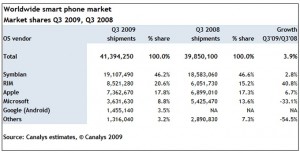I believe it is time to discuss the effect of the Operating Systems in the mobile space. To date, for the majority of users the operating system in the mobile device has been an indistinguishable part of the device; in fact, for many people, it is hardly noticeable that the usual stack we are accustomed to live with in the PC world (hardware, operating system and applications) is also present in the mobile phone we carry in our pockets, or purse, as it may be he case.
We know from observing the PC industry that the operating system brings invaluable service to the users and developers alike, as it allows for the same application to be able to run in a myriad of different hardware as long as all have the same operating system. In fact, the operating system is the “adapter” that allows the same application software to be compatible with the hardware of many different producers. The “adapter”, if it is able to turn into a “universal adapter”, harnesses huge value capturing power for its owner, as it becomes an indispensable tool for any user. Not for nothing Windows has become the most purchased software program in the world: it is a platform that allows developers to efficiently deploy software for most computers build around the Intel architecture. The value Windows has brought to the IT industry is unquestionable, as it has been its ability to generate wealth for Microsoft.
In the mobile space, and in the smart phone in particular, we have not had to worry too much about operating systems because users have not been installing and running applications on them at the same rate that they do on their PCs. We used to buy a smart phone, the applications were already installed (email, calendar, or whatever), and we used them right away. Different operating systems could coexist as long as manufacturers provided customers with complete solutions and these customers were not looking around for third party applications to run on their devices. But this is changing rapidly. Smart phones are becoming powerful computers and the possibility to have mobility-based applications that solve real business needs is a reality. In this context, it is unavoidable that the market will converge to a single “connector” that will avoid the painstaking effort that current developers have to endure to rewrite their applications for different devices, as they have to do now.
It is clear then, that following the PC model, the stakes are high to try to dominate this market. The owner of the winning operating system will be able to rip enduring long-term profits simply by maintaining a good product in the market at non-abusive prices. Who will win? This is an interesting question. The table above presents the Q3 2009 shipments of the different operating systems compared with those a year ago. Symbian, riding the lead of its owner Nokia in devices, leads the pack with 46.2% of the shipments, followed by RIM (Blackberry) with 20.6% and Apple with 17.8%. Symbian and Apple have increased slightly their market share from a year ago, while RIM has increased it drastically (a whooping 5.4% larger share) at the expense of Microsoft that has dropped its market share of shipments from 13.6% to 8.8%. Of notice is the irruption of Android form Google, that went from not existing a year ago to 3.5% this past quarter. Given the different strategies of the parent companies, the war will be fought between Symbian, Microsoft Windows Mobile, and Android. Why? RIM and Apple are closed platforms; they run only on the hardware developed for their companies, the Blackberry and the iPhone, and they are unlikely to be licensed to run on various hardware, so their abilities to become “the universal connector” is inexistent unless the complete market turns their way and we all end up carrying either a Blackberry or an iPhone, unlikely.
Having said that, the only systems that can run on multiple hardware platforms are Symbian, Microsoft’s Windows Mobile, and Google’s Android. Of those, the first two are licensed for a price and when the final user buys a phone, they also purchase the operating system, and a certain amount goes to the rightful owner of the system, much the same way as we do when purchasing a PC. When buying an Android phone, the cost associated with the operating system is zero, as Google makes it available to the developing and hardware community for free. Zero cost, a very sophisticated graphic interface, more than adequate developer tools, and a free killer application like the Earth Navigator (see previous blog post) makes Android my favorite candidate to win this battle. Needless to say that Google, not being a charity, has its own agenda for giving away such a potential money machine. This agenda includes eventually dominating the content distribution and advertising market in mobile, much the same way it dominates in the Internet. Additionally, if a “free” operating system becomes the winner, the purchaser of the device will have extra money to purchase additional third party applications or phones with more capabilities, which also makes the Android a favorite for manufactures and developers alike.
In any case, the next few months will be crucial to see the new devices and applications on Android, their acceptance by the market, and the evolution of these market shares. Then we will be able to bet on the winner with more probability to guess right.
Posted by Josep Valor on November 18, 2009 at 12:00 PM |



